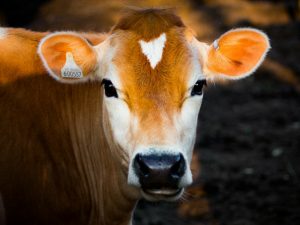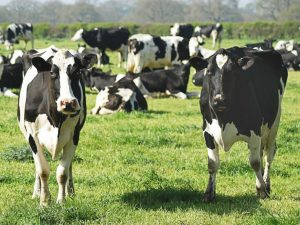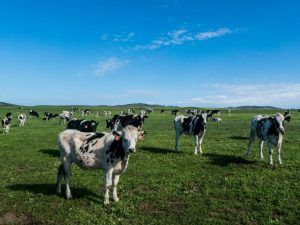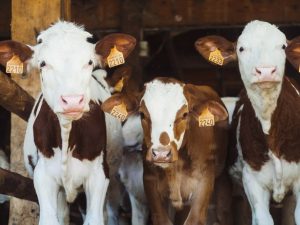Prices of Cows in Nigeria: Cow rearing is a key activity for residents in the northern section of the country, aside from turning it to meat. Due to their engagement in the breeding of cows and other animals, 50 percent of males in northern Nigeria are classified as herders. Cows provide work for many northerners, which helps to enhance Nigeria’s economy directly or indirectly.
In the nation, there are several varieties of cows. Some cows are bred to provide milk, while others are bred to generate big amounts of meat, and the remainder are bred to create a variety of progeny through cross breeding.

Cow rearing is a key activity for residents in the northern section of the country, aside from turning it to meat. Due to their engagement in the breeding of cows and other animals, 50 percent of males in northern Nigeria are classified as herders. Cows provide work for many northerners, which helps to enhance Nigeria’s economy directly or indirectly. In this nation, there are several types of cows. Some cows are known to produce milk, while others are known to generate significant amounts of meat, and the remainder are only read in one of two ways. cross-breeding offspring of many types.
Recommended: Cost of starting a school in Nigeria 2024
Current Prices of Cows in Nigeria
Nigeria is among Africa’s largest beef consumers. Nigerian cattle farming and business is both profitable and innovative. Cattle rearing is a job and a business closely associated with Nigeria’s Fulani ethnic group. Nigerians eat a lot of beef from cattle, which is why many people are interested in how many cows and cattle are sold in Nigeria.

The cost and pricing of cows in Nigeria are not inexpensive. Occasionally, the need to acquire a cow in Nigeria arises. This might be for milking or beef consumption in preparation for festivities, for example.
In Nigeria, the cost of cows varies according on the size and type of cow being purchased. In general, however, the price and cost of cattle in Nigeria has risen from its previous levels. This is due to issues such as insurgency in Northern Nigeria, antagonism against herders in Nigeria, and livestock rustling in some parts of the country.
It’s also worth noting that in Nigeria, holidays and seasons such as salah/Ileya celebrations and Christmas have an impact on cow prices. Due of increased demand, prices are always on the high side throughout this season.
Also see: Requirements to become a Senior Advocate of Nigeria (SAN)
a. Small cows cost between N85,000 and N100,000.
b. N150,000 to N220,000 for a medium-size cow (150kg – 200kg).
c. N230,000 to N300,000 for a big-size cow (220kg – 250kg).
d. The price of a really large cow (300kg–350kg) varies between N300,000 and N500,000.
e. The price of a large cow (400kg–550kg) ranges from N500,000 to N700,000.
If you’re considering purchasing cows to commemorate funerals, naming ceremonies, structures, and other occasions, the type of cow you buy will be different from the type that is normally reared. Even if you intend to rear it, the reasons for doing so are important. You should decide if you want to raise cows for milk production or for resale to help you pick the right type or breed.

Recommended: Countries with the Most Women in Africa
Different breed of cows in Nigeria
The following is a thorough description of the many cow breeds in Nigeria.
1. Red Bororo/ Mbororo: The Fulani tribes of Nigeria are noted for raising the Red Bororo breed, also known as Mbororo. This cow breed is mostly used for meat production. Red Bororo cows are the finest choice if you need a cow for an upcoming party.
Because of their reddish-brown coloring and long horns, this cow is usually simple to detect. They are very addicted to nomadic lifestyles, just like their masters, and can tolerate terrible weather conditions (without rain) for months.
2. White Fulani/ Bunaji: Bunaji, also known as White Fulani, is a popular cow breed in Nigeria, particularly in the northern provinces. Although they can be found throughout Africa, they are most frequent in Nigeria.
The horns of the White Fulani are large and long, with white or light tints. It’s really advantageous because it may be used for both meat and milk production. This is due to its great nutritional value and ability to lactate for over 200 days per year.
The cow breed is also one of the toughest because it can tolerate hard weather and is disease resistant.

Also see: Most Educated Tribes in Nigeria and Why
3. Ndama/ Malike: Another famous cow breed in the North is the Ndama, which goes by several different names. This includes Malike, Mandingo, Boyenca, and others. Ndama is primarily bred for meat production. Despite its small size and lack of horn, it is capable of generating sufficient lean meat.
It can only produce 2 to 3 liters of milk per day, unlike the White Fulani cow. As a result, it is unfit for milk production.
4. Sokoto Gudali: White Fulani cows are identical to Sokoto Gudali cows. It is capable of producing both milk and meat. It can produce many liters of milk every day, despite its massive size and stumpy horns.
The Sokoto Gudali cow has a poor reproductive rate despite its dual advantages. It can only produce one calf at a time. They’re also more likely to give birth to stillborn children or suffer a miscarriage.
Also see: Punishment for stealing in Nigeria
5. Muturu: With an average height of 95cm, Muturu is one of Nigeria’s smallest cow breeds. They are usually utilized for farm labor due to their strength and massive bodies. They’re not good for milk production since they produce less milk per day. Muturu also have the benefit of growing quite quickly.
Also see: How to become a professional photographer
Major Cattle Markets in Nigeria
The following are the major cattle markets in Nigeria that service the smaller cattle and beef markets in Nigeria. These marketplaces guarantee a variety of cow breeds and their calves.
a. Mubi international cattle market, Adamawa state
b. Wudil Cattle market, Kano state
c. Sheme Cattle market, Katsina state
d. Maitagari cattle market, jigawa state
e. Potiskum cattle market, yobe state
These are the main cattle markets in Nigeria, where animals may be purchased at very reasonable costs.
Also see: Advantages and Disadvantages of Being a Doctor
Tips on starting a cow business in Nigeria
This section may be irrelevant to someone who is only looking to purchase a new cow for food. This is due to the fact that you will only purchase one or two cows for your event.
For individuals considering investing in the Cowell industry, there are a few things to consider before purchasing any number of cows.
1. Get them a healthy ranch: This is the first thing you need to do since you do not want to expose them to thieves or severe weather conditions. To avoid illness infection, the environment must be kept clean and healthy.
2. Prepare all supplies: You must guarantee that you have all you need for a profitable cow company. Before you decide to buy more cows, you should have drinking bowls and other equipment on the ground.
As soon as all of the above components have been evaluated and created, you are ready to begin.
Recommended: Advantages and Disadvantages of Alternative Dispute Resolution (ADR)
Conclusion
The breed of cow you wish to buy will be determined by the following factors: Nigerian cow breeds, the place where you made your purchase, size and age of the cow, season or period of purchase, as well as the expense of growing the cow. When purchasing a cow, the aforementioned considerations are quite important. This is why cows brought in the Northern states and large markets are sold at a lower price than in other areas.

Edeh Samuel Chukwuemeka, ACMC, is a lawyer and a certified mediator/conciliator in Nigeria. He is also a developer with knowledge in various programming languages. Samuel is determined to leverage his skills in technology, SEO, and legal practice to revolutionize the legal profession worldwide by creating web and mobile applications that simplify legal research. Sam is also passionate about educating and providing valuable information to people.
How is the cow market high dew to cost of meal